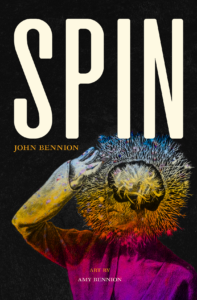 Title: Spin
Title: Spin
Author: John Bennion
Publisher: BCC Press
Genre: Novel
Year Published: 2022
Number of Pages: 470
ISBN: 978-1948218535
Reviewed by Rachel Helps
Lily divorces from her powerful and narcissistic husband, leaving her with nothing. Lily is determined to be with her daughter, even if it means kidnapping her! With the help of a randomization device, fate/God/the author brings her to what she needs when she needs it (most of the time). Her life on the run, including her homelessness, is incredibly stressful to read about, and the details make it even more realistic. Things do ease up, and John Bennion has multiple first-person narrative digressions in his voice–a voice so distinct I could hear him talking. He talked about how, when Lily uses the randomization device, he as an author also uses a randomization device to determine the story’s narrative (i.e., he flips a coin or gets a random number generator out). Why does he do this?
This is a question I am really wondering about. If I think about, it kind of makes me annoyed. You’re an author! You should want to say something and then do that! But deciding to make randomization a co-author of your story is a distinct narrative decision. In the AML book club discussion, one woman mentioned that, when you are undergoing a mental breakdown, sometimes it feels too difficult to make a decision, and having something else make a decision “for” you can help you move forward. So narratively, it can make sense. But the way the spinner helped her locate her daughter and safety seemed highly improbable. John explicitly relates the spinner to the Liahona in the Book of Mormon, a device oft-imagined as a compass that shows the right direction to go in, if the user is righteous. Is the spinner a way for Lily to petition the god of her universe–John?
I also had questions about the usefulness of John’s explanations in his narrative insertions. It’s more satisfying for me as a reader to make connections myself, rather than having John explain them to me. And constant reminders of the author pulled me out of the immersive experience of being in the story. There were a bunch of things that John said in his essayistic forays that he was saying a lot better with his story. But I also liked hearing from him??
I feel conflicted about a lot of the methods in this book, and I think that is what a good experimental novel will do: challenge our assumptions about what a novel should be. Why should the author have a complete narrative in mind when he writes a book? Why shouldn’t the author reflect on their own writing in their novel? I like this feeling of being at unease.
